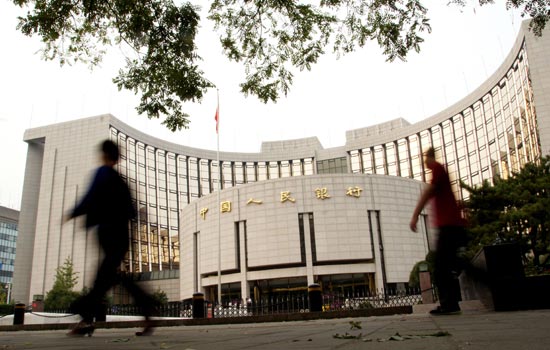|
 |
|
The headquarters of the People's Bank of China in Beijing. The central bank vowed on Aug 2, 2012, to maintain a prudent monetary policy and intensify structural adjustment of banks' lending to satisfy the financing needs of important projects. [Photo/China Daily] |
PBOC report warns that inflation may rebound slowly after August
China's central bank pledged to maintain its prudent monetary policies and further adjust banks' lending practices to ensure important projects can obtain financing, while warning that inflation may rebound in the country.
"Stabilizing economic growth will be more important in the next stage and macroeconomic controls should be ... relevant and flexible," according to a People's Bank of China report released on its website on Thursday.
The report called for China's monetary policies to manage liquidity in the country's financial system, saying that is the best way to accelerate economic growth.
"After August, the year-on-year consumer price index is likely to rebound slowly," the report said. At a time when labor and resource production are becoming more expensive, a resurgence in demand could lead to a high rate of inflation.
"The monetary policies might start to lose efficacy and yet spur inflation," the report said.
China has tried to bring consumer inflation back under control after it spiked to a three-year high of 6.5 percent in July 2011. That increase followed the country's adoption of a monetary and fiscal easing plan that injected 4 trillion yuan ($635 billion) into the economy in the 2008-09 global financial crisis.
In June, China's inflation rate decreased to a 29-month low of 2.2 percent, far below the government's official target of 4 percent. Seeing that, many investors began to worry that the monetary policies were constricting the country's economy and foiling measures the government had taken over nearly 10 months to spur growth, such as reducing benchmark interest rates in June and July.
A report published by Financial News, a newspaper affiliated to the central bank, said: "Some contributors to the latest round of inflation have not been eliminated and the prices of goods previously under control could rebound again."
The report called for the government to maintain restrictions meant to eliminate speculation in the country's real estate market, which saw the prices of homes double in important cities from 2009 to 2011. That quick increase pushed housing beyond the means of many middle-class Chinese, the report said.
The world's second-largest economy may see its economy continue to slow down in the third quarter of the year, Jing Ulrich, chairwoman of global markets China at JPMorgan Chase & Co, said on Thursday in an interview with Bloomberg News.
If that does happen, JP Morgan may predict an even lower rate of growth for China's 2012 GDP, which it now says will be 7.7 percent.
The National Bureau of Statistics will release July consumer price index and industrial product data next week.
"We expect the data to demonstrate that government infrastructure projects and policy support are helping the economy gain traction," said Wang Tao, chief economist in China at UBS AG.
Although the central government confirmed at a meeting on Tuesday that a moderate easing stance in support of growth will remain in place, officials are unlikely to announce another large stimulus package, Wang said.
Reuters contributed to this story.
